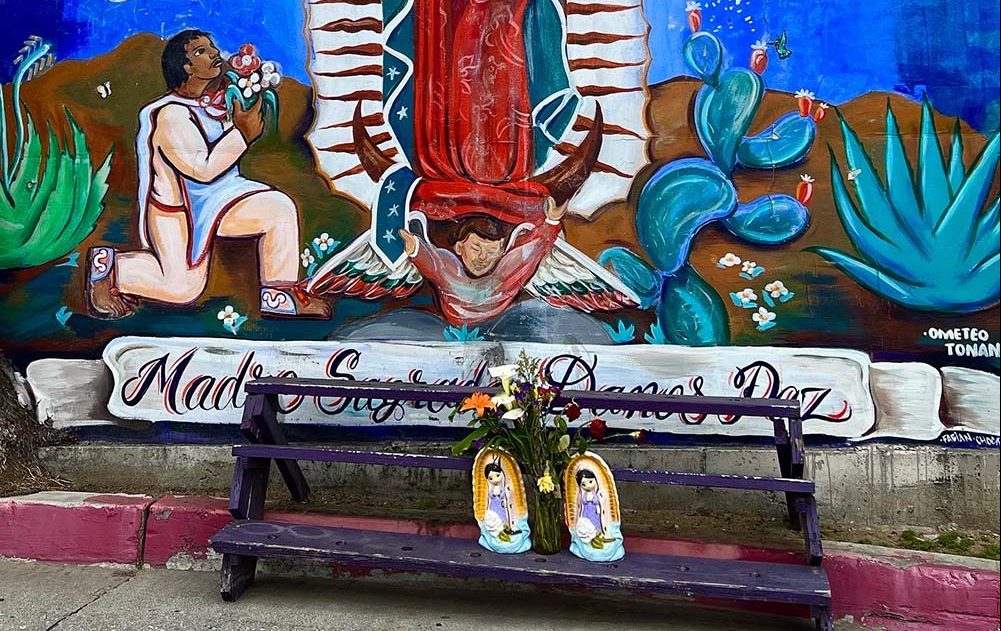Ethnic and Race Studies
A true leader views the world through cultural lenses.
Study the experiences of ethnic and racial groups to learn how they shaped current U.S. society with their social justice efforts.
Build interdisciplinary foundations
How have race and ethnicity been defined, constructed and applied in different places and times? How do they intersect with other ways of understanding difference, such as gender, class, nation and religion?
In this cross-disciplinary major, you’ll answer these questions by working closely with dedicated professors from across multiple fields of study. From theatre arts, English, political science and more, you’ll graduate with a global worldview that will make you a marketable candidate in your future careers.
Get firsthand experience
Engaging with communities of color will give you critical perspectives and cross cultural communication skills. You’ll have the opportunity to gain experience with fieldwork or internships in these communities.
Double your major
This program offers many electives that also count toward general education requirements, so you can easily add ethnic and race studies as a double major by taking courses such as:
- Race and the City in Film
- Borders, Refugees and (Im)migration in a Changing World
- Sociology of Education
- Research Methods with Communities of Color
- Latina/os in the United States
- Ethnographic Methods
At a Glance
Degree Type
Bachelor of Arts
Department
Ethnic and Race Studies
School/College
College of Arts and Sciences
Next Steps
Interested in this major? Here's what you can do next:
With challenging and relevant courses, outstanding faculty, small class sizes, and an emphasis on hands-on learning, the ethnic and race studies program will position you to succeed in your chosen career.
Program Details
Find out what it takes to earn a degree in ethnic and race studies and explore the courses.
Highlighted Courses
Get familiar with some of the courses you might take in this major.
ENGL 353: Gender and Literature: U.S. Diversity
This course will focus on the literary methods of gender analysis, historical analysis, and reader response as three lenses among many through which to deepen your understanding of literature; and will apply these tools to several texts, both historical and contemporary, in which the social categories of gender, sexuality, race and class are of principal concern.
See descriptionERS 101: Introduction to Ethnic and Race Studies
This introductory Ethnic Studies class draws upon interdisciplinary approaches to understand and problematize the study of race and ethnicity in the United States. The class will discuss the social construction of race and ethnicity coupled with the intersectionality of identify and positionality across race, class, gender and sexuality.
See descriptionERS 334: Sociology of Education
This course provides an overview of sociological theories of education and current research about education in the United States. Analysis will include the school as a social institution comprised of specific roles, values, and norms. We will examine the role of schooling in both reproducing and challenging social inequalities with an emphasis on how social class, race, gender, ethnicity, immigration, and sexual orientation impact the organization of school, the development of curricula, and the experiences of students.
See descriptionHIST 326: Civil War: Slavery to Civil Rights
An examination of sectionalism, Civil War and the Reconstruction with emphasis on primary source interpretation. Topics include racism and slavery, the contrasting natures of Northern and Southern societies, the politics of sectionalism, the causes and goals of the Civil War, and racial relationships and policies from Reconstruction to the modern civil rights movement.
See descriptionSOC 300: Sexuality and Society
Primarily focusing on the United States, this course examines sexuality through a sociological lens. We will explore how sexual attitudes and behaviors have changed over time, looking at which sexual attitudes and behaviors are considered "normal" vs. "deviant," and "moral" vs. "immoral" in mainstream society and different subcultures.
See descriptionSOC 360: Racial and Ethnic Relations
The course examines the historical, political, economic, and cultural dimensions of racial and ethnic relations in the United States from the mid-1800s to the present, with an emphasis on racism. Includes an investigation of the link between residential segregation and opportunity for African Americans, a critical interrogation of whiteness and white privilege, and an exploration of racism in California, particularly for California Indians.
See descriptionRecommended Minors
Want to add even more value to your degree? Consider one of these minors to gain a unique combination of skills and perspectives.
We offer hands-on opportunities that give you the freedom to explore your passion through real-world work and prepare for a fulfilling career.
-
Internships and Field Trips
Internships provide hands-on experience in various professional settings, allowing students to apply their knowledge in real-world contexts and build valuable skills. Conference experiences offer the chance to engage with leading scholars and practitioners in the field, expanding students’ perspectives and networks. Field trips provide immersive learning experiences, allowing students to explore diverse communities and cultural sites firsthand.
-
Study Abroad
Cal Lutheran offers a range of options for study abroad, from semester programs to short-term travel seminars.
Benefits of studying abroad include:
- Gain international perspective
- Build proficiency in a language
- Learn to navigate a different environment
- Develop intercultural awareness
- Enhance your resume for jobs

Learn About (Im)migration in a Changing World
Our course on Borders, Refugees and (Im)migration in a Changing World explores how US policies contribute to and shape the contours of contemporary immigration. How can we make sense of contemporary attitudes toward immigration considering the longer history of immigration policy and enforcement in and by the United States? How does the US position itself as a nation to receive and rescue immigrants, who gets in, who is kept out and how do these move shape understandings of race, gender, class, and sexuality domestically?
A degree in ethnic and race studies prepares you to become an effective leader in diversity. As the U.S. population becomes more diverse, employers value leaders who can work with people from various backgrounds and know how to foster diversity to reach organizational goals.
Potential Careers
Public Relations Specialists
Promote or create an intended public image for individuals, groups, or organizations. May write or select material for release to various communications media. May specialize in using social media.
See descriptionArea, Ethnic, and Cultural Studies Teachers, Postsecondary
Teach courses pertaining to the culture and development of an area, an ethnic group, or any other group, such as Latin American studies, women's studies, or urban affairs. Includes both teachers primarily engaged in teaching and those who do a combination of teaching and research.
See descriptionCommunity Health Workers
Promote health within a community by assisting individuals to adopt healthy behaviors. Serve as an advocate for the health needs of individuals by assisting community residents in effectively communicating with healthcare providers or social service agencies. Act as liaison or advocate and implement programs that promote, maintain, and improve individual and overall community health. May deliver health-related preventive services such as blood pressure, glaucoma, and hearing screenings. May collect data to help identify community health needs.
See descriptionEducational, Guidance, and Career Counselors and Advisors
Advise and assist students and provide educational and vocational guidance services.
See descriptionChild, Family, and School Social Workers
Provide social services and assistance to improve the social and psychological functioning of children and their families and to maximize the family well-being and the academic functioning of children. May assist parents, arrange adoptions, and find foster homes for abandoned or abused children. In schools, they address such problems as teenage pregnancy, misbehavior, and truancy. May also advise teachers.
See descriptionEqual Opportunity Representatives and Officers
Monitor and evaluate compliance with equal opportunity laws, guidelines, and policies to ensure that employment practices and contracting arrangements give equal opportunity without regard to race, religion, color, national origin, sex, age, or disability.
See descriptionSocial and Community Service Managers
Plan, direct, or coordinate the activities of a social service program or community outreach organization. Oversee the program or organization's budget and policies regarding participant involvement, program requirements, and benefits. Work may involve directing social workers, counselors, or probation officers.
See descriptionHuman Resources Managers
Plan, direct, or coordinate human resources activities and staff of an organization.
See descriptionLooking for more career paths? Search these related areas to discover more options.
This page includes information from O*NET OnLine by the U.S. Department of Labor, Employment and Training Administration (USDOL/ETA). Used under the CC BY 4.0 license. Some occupations listed above may require a related graduate degree.
How We Prepare You for Success
We have 20,000+ employer contacts for jobs and internships, with over 200 listings posted each week.
Our excellent career counselors in the Career Services center will get in touch with you during your very first term on campus. They offer over 50 workshops each year on resume writing, interviewing, salary negotiations, applying to graduate schools, and other critical skills to help you begin your career successfully.
After you graduate from Cal Lutheran, you receive free access to Career Services for life, as a valued member of our alumni family.
of Cal Lutheran graduates find a job or enroll in graduate school within nine months
We work with students and families to make sure everyone who is admitted to Cal Lutheran can afford it.
Tuition & Fees
You and your family might have questions about how you’ll cover the costs of college. We can tell you this — it costs less than you think.
Scholarships & Grants
We offer a range of awards based on academic merit and financial need. This is money that does not need to be repaid.
Financial Aid
If you're new to the financial aid process, you probably have a lot of questions. But don't worry — we're here to help guide you all the way.
Let us know and we'll send you information about our academics, campus life, the admission process, and more!
Level Up Your College Search
Check out our college success guides to help you navigate the search process.

5 Tips for Applying to College
Learn how to look good when applying to colleges, with personal tips to stand out from Cal Lutheran admission counselors.

How to Afford College
Read this guide to minimize costs as you save for college during high school — learn all about scholarships, financial aid, FAFSA, and more!

How to Choose a College Major
Your major will be a significant part of your academic experience. How do you pick the right one?